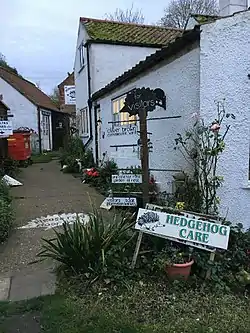| Hedgehog Care | |
|---|---|
 Hedgehog Care in 2017 |
Hedgehog Care is a British animal welfare rescue, dedicated to the rescue and treatment of hedgehogs. It was founded in 1980 by Elaine Drewery, who continues to operate it. It started from small beginnings with her taking home injured hedgehogs she chanced upon. Then people began bringing animals they found to her and the rescue service grew from there.[1] Drewery has been described as "the doyenne of England's hedgehog ladies" by the Wall Street Journal.[2] Hedgehog Care describes itself as "Lincolnshire's Famous Little Hedgehog Hospital."
It is located in Authorpe, Lincolnshire. Hedgehog Care generally cares for 50-200 hedgehogs at any given time, and approximately 1,500 per year.[3][4] The majority of the hedgehogs admitted come from the surrounding Louth area.[5] Elaine Dewery welcomes visits from individuals and school parties, and gives talks to organisations such as the Scouts and the Women's Institute. Funds are raised through a second-hand clothes shop.[1]
Hedgehog Care is known for providing aid and expertise to other hedgehog rescuers in the United Kingdom.[6] It is endorsed by the UK organic growing charity Henry Doubleday Research Association which recommends its services for ill and injured animals.[7]
See also
References
- 1 2 "Hedgehog village". The Independent. 1 September 1992. Archived from the original on 9 May 2022. Retrieved 10 January 2017.
- ↑ Wells, Ken, ed. (2 December 2003). Herd on the Street: Animal Stories from The Wall Street Journal. Free Press. p. 73. ISBN 978-0743254205.
- ↑ "Skegness community church helps Authorpe hedgehog hospital". Skegness Standard. 26 November 2013. Retrieved 6 January 2017.
- ↑ "Hedgehog Care Hospital needs help". Grimsby Telegraph. 27 April 2010. Retrieved 6 January 2017.
- ↑ Warwick, Hugh (30 October 2008). A Prickly Affair: My Life With Hedgehogs. Allen Lane / Penguin. pp. 151–152. ISBN 978-1846140655.
- ↑ "New Hedgehog hospital nurses dozens back to health". Scunthorpe Telegraph. 24 August 2014. Archived from the original on 29 September 2014. Retrieved 6 January 2017.
- ↑ Henry Doubleday Research Association. Newsletter. 1993.